|
Theodore
Roosevelt 1906 White House
Letter References the Birth of William Loeb III, Powerful
Conservative Publisher of the Manchester Union Leader
President Roosevelt
Becomes Godfather to His Secretary William Loeb's New Son!
Framed with
Stereoview
of President Roosevelt with Secretary Loeb
"Those are first-class stork
puzzle cards. Do you know that Mr. Loeb has been in the stork business himself
and is now the happy father of a boy!"
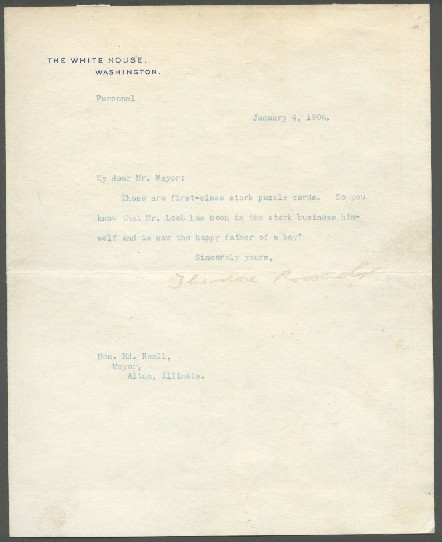



This is one of Theodore Roosevelt's humorous and
exuberant letters which has the added benefit of being on White House stationary
with a White House envelope and mentioning a father and son that had important
roles in history. The Mayor of Alton, Illinois, Edmund Beall, had
sent President Roosevelt some stork puzzle cards and in this letter President
Roosevelt thanks him for
them and references Mr. Loeb, who was also in the "stork business" by being the
recent father of a baby boy.
The Mr. Loeb referenced in the letter who had a
baby boy was
William Loeb, Secretary to the President. The boy who was born to TR's
secretary,
William Loeb III, became a powerful figure in the Republican party as the
publisher and editor of the only statewide newspaper in New Hampshire, the
Manchester Union Leader. Loeb was born on December 26, 1905, about a week
before Roosevelt mentioned him in our letter. Loeb's birth would have been on
his mind not only because of the recent birth of one of his closest aides, but
because he also was the boy's godfather!
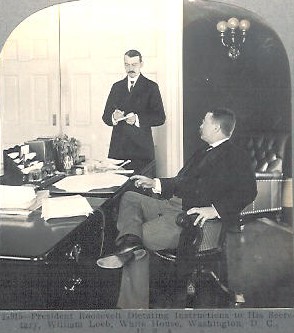
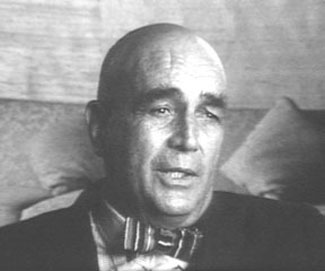
TR dictating to William Loeb II in 1905
photograph and William Loeb III, his godson the powerful publisher
The Manchester Union Leader
was important because of the
critical role of the New Hampshire Primary in making or breaking Presidential
aspirations and Loeb was an outspoken conservative who had a considerable
influence, especially on Republican nominees. Loeb was publisher and editor of
the influential newspaper from 1946 through 1982, spanning Presidents Harry
Truman though Ronald Reagan.
The senior Loeb, Roosevelt's secretary, played a
leading role in two memorable stories about Roosevelt, how he
became President and how he chose his successor. The first story comes from two
sources:
First this account of he accession to the
Presidency from Theodore Roosevelt: An Intimate Biography by William
Roscoe Thayer:
On Friday, September 7, 1901, banner
headlines of extra editions of Buffalo’s newspapers shouted "McKinley Shot!"
These awful words reached Vice-President Theodore Roosevelt at Isle LaMotte,
Lake Champlain where he was a guest of the Vermont Fish and Game Club. He
immediately made his way to Buffalo.
Ansley Wilcox later wrote, "...I met him on Saturday
noon (Sept. 7)...and a brief conversation resulted in his coming to stay at my
house...until the following Tuesday (Sept. 10). At that point signs were very
encouraging and it was thought that President McKinley would recover from his
wounds."...it was thought best that the Vice-President should go away in order
to impress the public with that confidence..." Leaving his itinerary with
Ansley Wilcox in case he should be needed, Vice-President Roosevelt left
Buffalo to join his family vacation in the Adirondacks at the Tahawus Club.
In the early morning hours of Friday, September 13, Mr.
Wilcox was aroused by a messenger with the news of President McKinley’s
worsening condition and was advised to contact and send for the
Vice-President. A telephone call was made to Roosevelt’s Secretary William
Loeb, who had remained in Albany in case of such a turn of events. Receiving
the message Loeb immediately arranged for a special train and by 8:00 a.m.
that morning (Fri. Sept.13), he was in North Creek ready to escort Theodore
Roosevelt back to Buffalo. Meanwhile, Loeb telephoned this message from the
President’s cabinet to Tahawus Post Office, the end of the telephone line:
Hon. T. Roosevelt
The President appears to be dying and members of the
cabinet in Buffalo think you should lose no time in coming.
Elihu Root
All Friday morning and afternoon, William Loeb, was
making arrangements to bring Theodore Roosevelt from the Tahawus Club to the
train Station at North Creek, a trip that was to be accomplished in 3 stages
over a 35-mile trail which had been made treacherous by three days of rain.
Roosevelt left the Tahawus Club at 10:30 p.m. Friday,
September 13, and traveled by wagon the ten miles to Tahawus post office in
two hours. He stopped long enough to contact Loeb in Albany by telephone and
drink a cup of coffee. Ten minutes later the journey resumed and the next 9
miles to Aiden Lair were covered in 2 hours and 20 minutes.
At 3:00 a.m. on Saturday, Roosevelt arrived at Aiden
Lair and the final relay began. The last 16 miles covered the roughest part of
the country so far. There was a misty rain which made the road very slippery
and the night "perfectly black." The driver had been put on notice to be ready
to leave at anytime since Friday at noon. While waiting in the early morning
hours of Sat. Sept. 14, he received a telephone call from Loeb who told him
that President McKinley had died in Buffalo at 2:15 a.m. He decided not to
tell Roosevelt, feeling that it was not really his place to relay such an
important message and further, he did not want to add to his anxiety.
And this short account from
Doris
Ursitti in the Fall 1991 issue of "The Columns:"
The climbers on Mount Marcy were fifty miles from the end of the
railroad and ten miles from the nearest telephone at the lower club-house. They
hurried forward on foot, following the trail to the nearest cottage; where a
runner arrived with a message, “Come at once.” Further messages awaited them at
the lower club-house. President McKinley was dying, and Roosevelt must lose no
time. His secretary, William Loeb, telephoned from North Creek, the end of the
railroad, that he had had a locomotive there for hours with full steam up. So
Roosevelt and the driver of his buckboard dashed on through the night, over the
uncertain mountain road, dangerous even by daylight, at breakneck speed. Dawn
was breaking when they came to North Creek. There, Loeb told him that President
McKinley was dead
The story of Loeb's role in picking Roosevelt's
successor comes from
An
Address by William J. vanden Heuvel On the occasion of the 100th anniversary of
Theodore Roosevelt’s becoming President of the United States:
As 1908 began, there was no front-runner for the Republican
nomination to succeed TR. The conservative leaders in Congress suspected and
were fearful that TR would create “a crisis” to justify his re-nomination,
setting aside his written pledge not to run. In January 1908 William Loeb, TR’s
private secretary, interrupted the President’s breakfast on an early January
morning to discuss the upcoming convention. Loeb argued that TR could only
sustain the credibility of his promise not to run by endorsing a candidate. Loeb
told TR that any nominee could win—naming William Howard Taft, Elihu Root,
Charles Evans Hughes and George Cortelyou (the Secretary of the Treasury)—if
only TR would back him. In response, TR said that he would favor Elihu Root and
authorized Loeb at that moment to go to see Root and make the offer of his
endorsement. Root, then Secretary of State, was astonished by Loeb’s message but
without hesitation asked him to assure the President of his gratitude but also
of his inability to accept because he judged himself to be unelectable. Loeb
interrupted the President’s schedule that same day to report on his meeting. TR
accepted Root’s decision. He then told Loeb that his choice was William Howard
Taft, saying that he had the experience to run the government. Taft could hardly
believe his good fortune.
Mayor Ed Beall, who the TR letter is addressed
to, would later be a delegate to the 1908
Republican National Convention which nominated Roosevelt's preferred successor,
William Howard Taft, to succeed him as President.
The type and signature are a tad light, but perfectly readable. The 7 x 9 inch letter reads as follows:
The White House,
Washington
Personal
January 4, 1906
My dear Mr. Mayor:
Those are first-class stork puzzle cards. Do you
know that Mr. Loeb has been in the stork business him-
self and is now the happy father of a boy!
Sincerely yours,
Theodore Roosevelt
Ho. Ed. Beall,
Mayor, Alton, Illinois
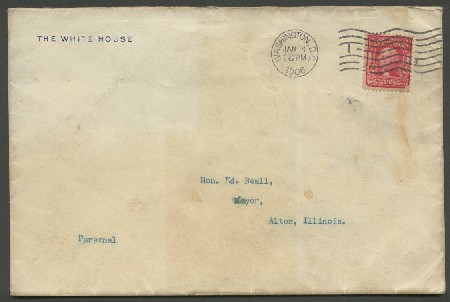
Also included is "The White House" envelope shown above
postmarked Washington, D.C., JAN 4, 2:30PM, 1906 which is enclosed in a plastic
sleeve on the back of the framed autograph.
The total package has been framed together
as shown below with a brief explanatory note.
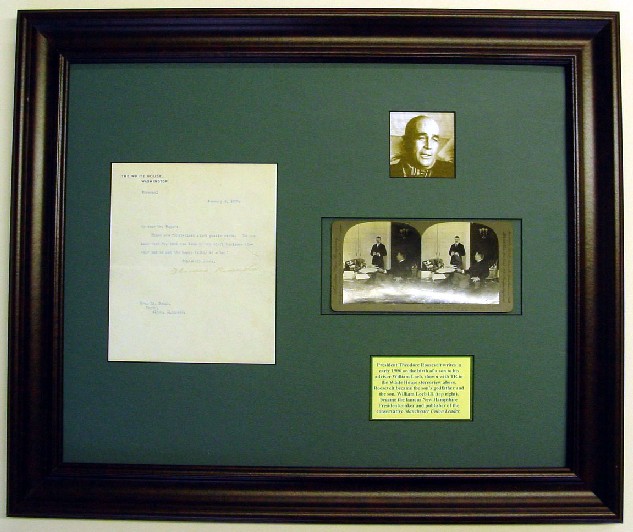
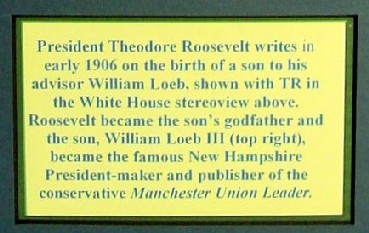
This framed White House letter from Theodore Roosevelt has a lot going
for it, with its humorous tone and its reference to his secretary and close
advisor William Loeb and the birth of his son, the famous publisher of the
Manchester Union Leader. The letter provides wonderful associations to
President Roosevelt's history and the history of Presidential and Republican
politics through the 1980s.
Price: $800
Pay securely with credit card through PayPal by clicking the
button below
|